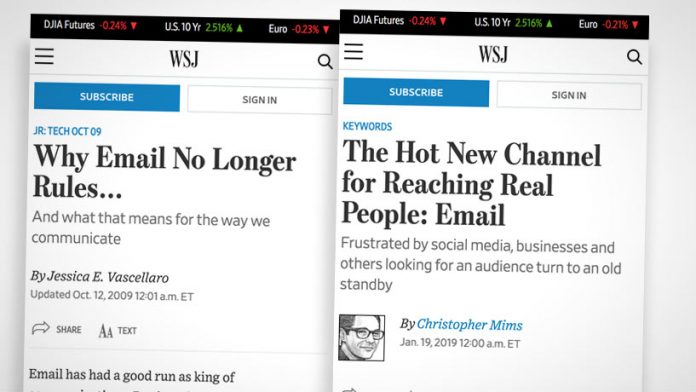
In 2009, The Wall Street Journal and many others opined email’s demise, citing the rise of Twitter, Facebook and other social channels as the new frontier in business and consumer interactions.
Fast forward to 2019 and marketers — juggling Google, Facebook, and Twitter ads; maintaining their social presence, competing for likes and retweets — are increasingly returning to email, buoyed with the prospect of actually reaching real people!
#10YearChallenge. WSJ, 2009 (left) and 2019 (right)
Make no mistake, in 2019 maintaining your club’s social presence is an important tool in your marketing toolbox but if your club isn’t using email as a key pillar in its customer contact strategy, it’s time to ask why not.
Forrester Research recently concluded that 90 per cent of email gets delivered to the intended recipient’s inbox, whereas only 2 per cent of your Facebook Fans see your posts in their news feed. Leading management consulting firm McKinsey & Company also reports that email is 40 times more effective at acquiring new customers than Facebook or Twitter.
Email’s value is inherently personal
Most of us are bombarded with irrelevant media and messaging throughout our day. Email’s value is inherently personal; it enables marketers to cut through the digital clutter and reach customers — when done right — with a message relevant to their needs. Email marketing consistently drives more conversations than any other marketing channel, including search and social. It doesn’t need to be complex, or expensive, but like all effective marketing channels, content and context is key.
Do you remember the days of getting handwritten mail, addressed specifically to you, from friends, family and loved ones? Do you remember how happy it made you? Imagine, capturing that feeling and embedding it into a simple thank you message, automatically sent to green-fee paying guests playing at your club a few hours after they finish their round.
The abundance of Email Service Providers (ESPs) has made setting up lifecycle programs like this incredibly affordable. Most have monthly subscription fees that cost pennies per message and are chock-full of features that allow businesses of all sizes to craft compelling transactional and relational messages, create automation rules, set up activity-triggered messages, or insert dynamic, personalized content without needing to know how to write a single line of code.
Don’t be shy, ask for addresses at the point-of-sale
Canada’s Anti Spam Legislation (CASL) allows you to send email to customers for a period of up to two years from their date of last purchase. This implied consent opt-in distinction makes it easy for you to quickly capture a customer’s email address at the point-of-sale, add them to your list and convert them to an express consent, or subscriber, over time.
So, go ahead and get creative and make sure you’re not missing opportunities to grow your list. Don’t underestimate the value of taking 30 seconds to collect an email address from golfers as they pay for their round, or have your starter collect addresses as groups approach the first tee — then surprise them with that thank you message, automatically triggered to be sent later that evening.
Automated relational messages are incredibly powerful at increasing customer lifetime value and turning customers into advocates, averaging over 70 per cent higher open rates and 150 per cent higher click-through rates than “business as usual” marketing messages such as newsletters, mass-mailed offers or promotions.
Ready to start?
Before you do, take a few minutes and sweat the small stuff when crafting your messaging strategy and setting up your ESP account. Are your emails all sent from “info@______.com”? Try humanizing your messaging by ensuring your emails are sent from a personal address, include a properly formatted friendly-from address, or are signed by someone from the club. And, if you are going to use email templates, ensure they look authentic to your brand and the customer needs – not simply built by a marketing machine.
Donal Byrne has almost 20 years email/loyalty marketing experience, working for brands like BlackBerry, Bell/Allstream, and Golf Canada. He is the founder of TournamentCaddie, an online event management solution that allows event organizers throughout North America to create a free event website and begin collecting payment and registration in minutes.
TournamentCaddie also helps clubs grow their marketing list by collecting an optional email opt-in from golfers participating at events hosted at their club.
Visit: www.tournamentcaddie.com for more information.
Colleen Preisner is the Vice President, Client Fulfillment at Inbox Marketer, one of Canada’s leading, data-driven digital marketing agencies. Colleen oversees integrated digital projects for clients including; Sobeys, Petro-Canada, and Scotiabank.
Visit: www.inboxmarketer.com to learn more.











